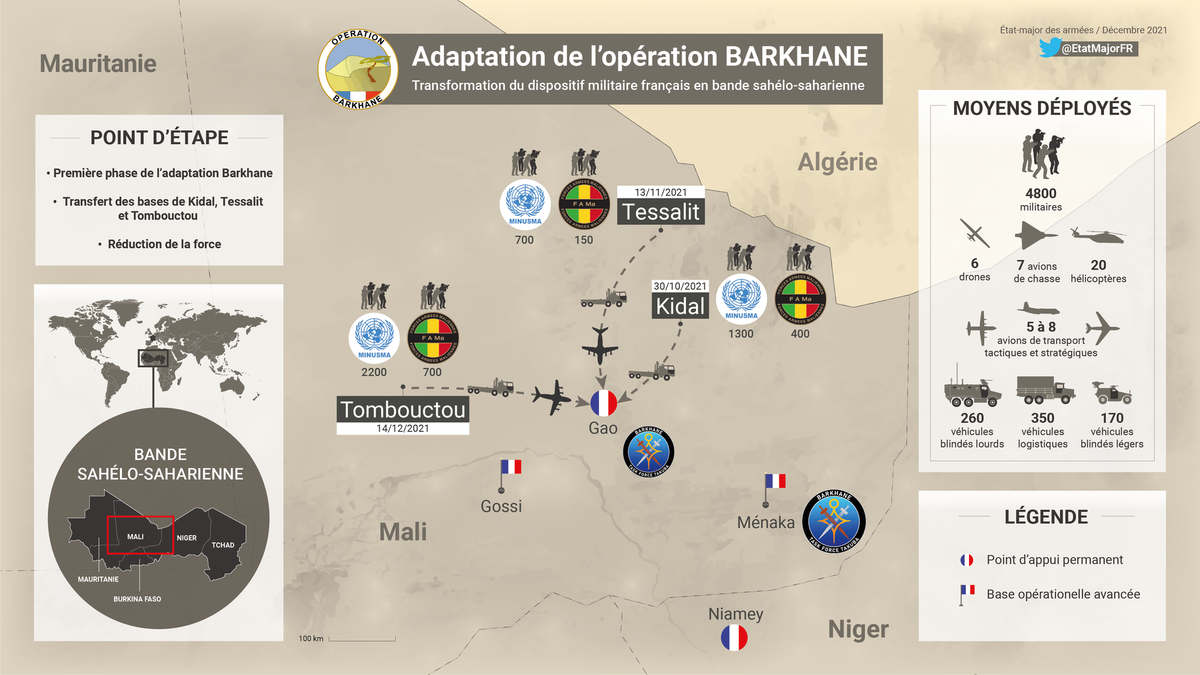Brigadier Alexandre Martin, 24, a member of the 54ᵉ Artillery Regiment of Hyères (Var) lost his life during an attack on the Operation Barkhane camp in Gao. Nine other soldiers were wounded. Interview with Leslie Varenne, director of the Institut de Veille et d’Etude des Relations Internationales et Stratégiques (IVERIS).
The attack on the camp in Gao, Mali, was carried out on Saturday at around 5 p.m. by shellfire from an area located about 5 or 6 km from the Barkhane operation camp. The origin of the fire is not yet known, but it is known to have occurred in an area frequented by jihadists from the Al-Qaeda nebula.
The attack left one person dead, Brigadier Alexandre Martin, 24 years old, from Rouen, and nine wounded, whose condition is no longer a cause for concern.
Brigadier Martin is the 53ᵉ dead in Operation Barkhane. This operation, conducted in the Sahel by the French army, is aimed at fighting armed jihadist groups. It was launched on August 1, 2014, succeeding Operations Serval and Épervier. It mobilizes several thousand soldiers.
Leslie Varenne: “A political defeat for France”
What is the situation in the Sahel for the French military?
This incident comes at a very bad time for the soldiers engaged in the Sahel as well as for the Head of State. Since 2019, the situation was already difficult and complex on the ground, but since then it has continued to deteriorate.
The decisions of Emmanuel Macron taken at the Pau summit in January 2020 to try to change the situation, have not been followed by effects on the ground. The security situation for the Sahelians has become increasingly delicate.
The decisions taken the following year at the Ndjamena summit did not lead to positive results either from the point of view of security or socio-economic development.
The security situation has been compounded by a deteriorating political situation, particularly in Mali with the coup d’état of 2020 and the events of May 2021. As for Burkina Faso, the situation is very volatile.
Do the French military operate in a favorable environment, particularly with respect to the local population?
With the sanctions put in place against the military junta in Mali by the ECOWAS, anti-French resentment has risen again. This situation is difficult for our soldiers to maintain, as they cannot operate serenely in an area where they are no longer welcome. The decisions taken in Paris, such as the economic sanctions against the Malian junta, have had consequences that weigh heavily on our military.
What should they do now?
In his speech to the European Parliament, as in his greetings to the Armed Forces, the French President sidestepped the difficult Sahel question. Nevertheless, this issue has been invited into the political debate of this presidential campaign. It is impossible not to ask the Head of State about his past, present and future strategy with regard to Mali. And especially if he is a candidate for re-election.
In her greetings to the Armed Forces, Minister Florence Parly declared: “In the Sahel, the security situation remains difficult and is now complicated by a very unfavorable Malian political context and the deployment of Wagner’s Russian mercenaries (…) We are going to have to find the way to, despite these difficulties, pursue the mission that we have set ourselves and for which the countries of West Africa are asking for our support: the fight against terrorism.
Paris wants to “find the way” for the anti-jihadist fight “in West Africa” (voaafrique.com)
She implicitly recognizes that France is at an impasse. But her statements suggest that France does not plan to leave Mali. Unless it leaves Gao like the Americans left Bagram (Afghanistan), the French withdrawal will take at least six months.
It remains a given that if Operation Barkhane is not a military defeat, it is already a political defeat for France.


